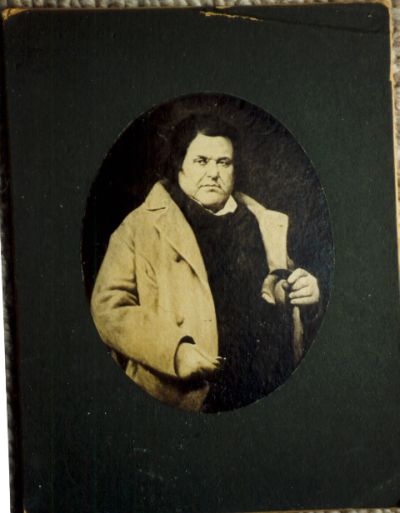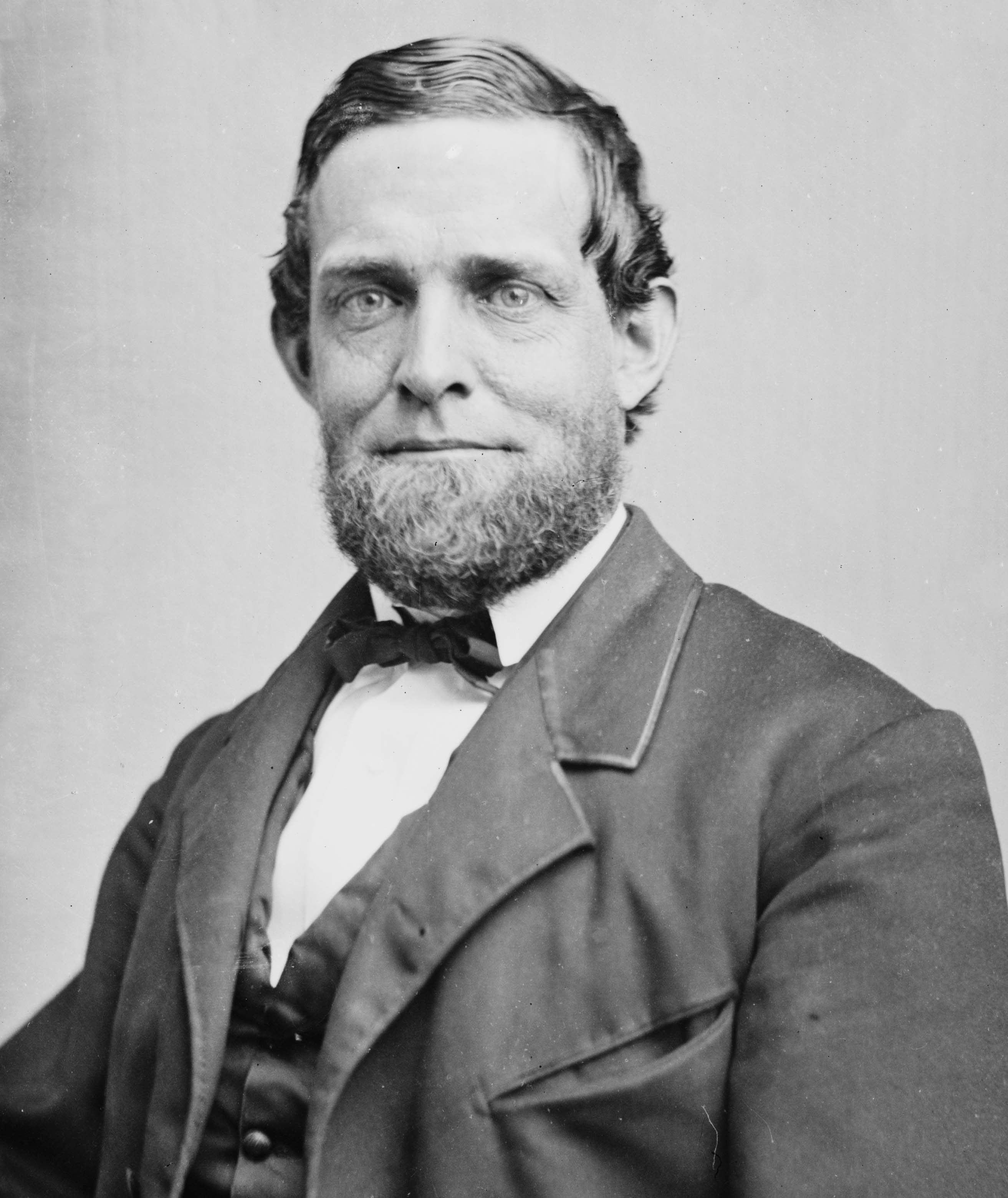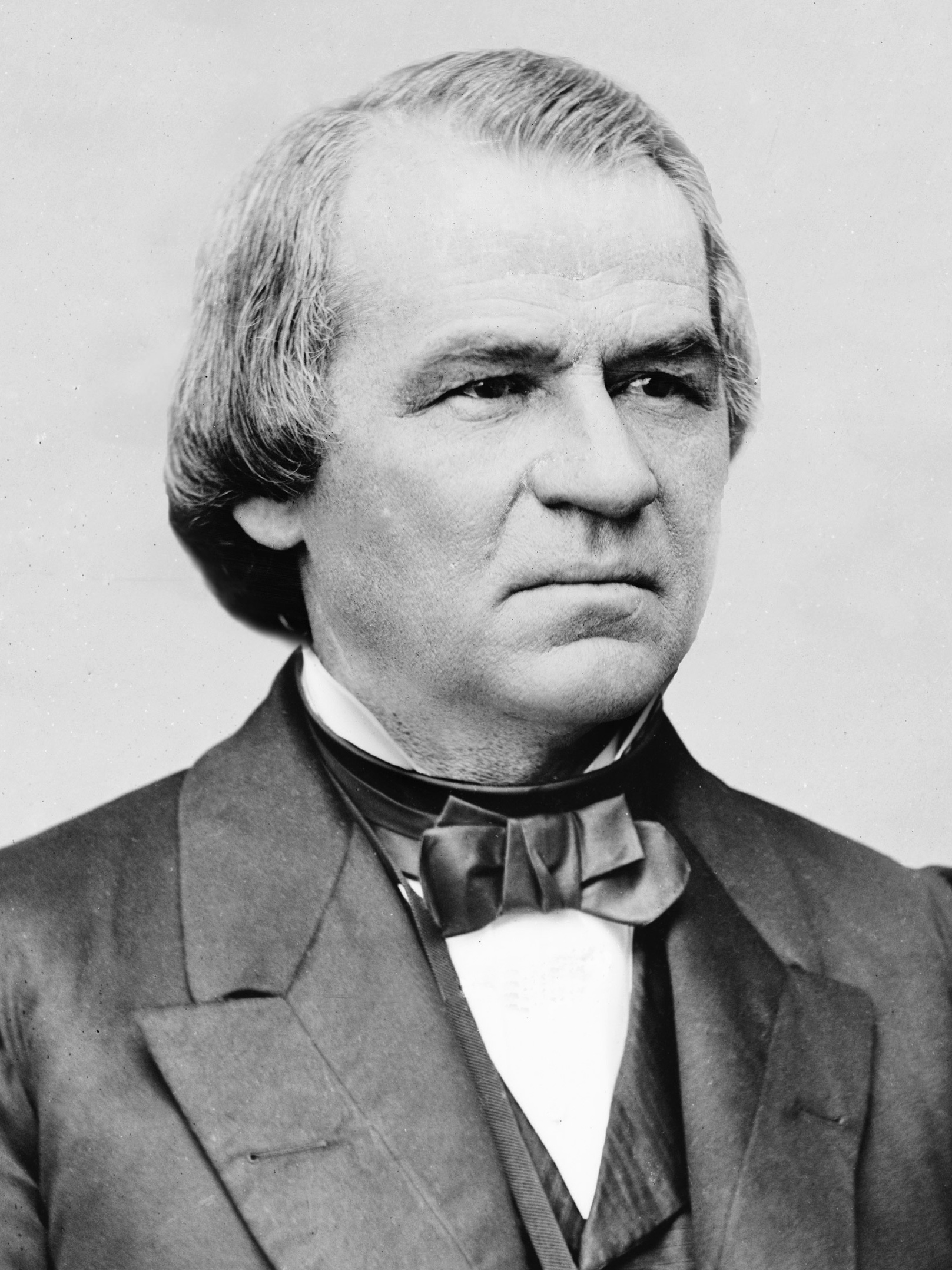|
Samuel Shellabarger (congressman)
Samuel Shellabarger (December 10, 1817 – August 6, 1896) was an American lawyer and politician who served three different stints as a Republican U.S. Representative from Ohio in the mid-19th century. Biography Born near Enon, Ohio, Shellabarger attended the county schools and was graduated from Miami University, Oxford, Ohio, in 1841. He studied law and was admitted to the bar, commencing practice in Springfield, Ohio, in 1846. He served as a member of the State house of representatives in 1852 and 1853. Shellabarger was elected as a Republican to the Thirty-seventh Congress (March 4, 1861 – March 3, 1863). He was an unsuccessful candidate for reelection in 1862 to the Thirty-eighth Congress. Shellabarger was elected to the Thirty-ninth and Fortieth Congresses (March 4, 1865 – March 3, 1869). He declined to be a candidate for renomination in 1868. He served as U.S. Minister to Portugal from April 21 to December 31, 1869. Shellabarger was again elected to th ... [...More Info...] [...Related Items...] OR: [Wikipedia] [Google] [Baidu] |
Ohio's 8th Congressional District
Ohio's 8th congressional district sits on the west side of Ohio, bordering Indiana. The cities of Hamilton, Fairfield, Middletown, Springfield, Eaton, Greenville, Piqua, and Troy are part of the district. The district was represented by Republican John Boehner, the 53rd Speaker of the United States House of Representatives. On September 25, 2015, Boehner announced his resignation from the speakership and retirement from Congress, which became effective on October 31, 2015. The current representative for this district is Republican Warren Davidson, who defeated Democrat Corey Foister and Green Party candidate James J. Condit Jr. in the 2016 special election to fill Boehner's seat. Election results from presidential races List of members representing the district Recent election results See also *Ohio's congressional districts *List of United States congressional districts Congressional districts in the United States are electoral divisions for th ... [...More Info...] [...Related Items...] OR: [Wikipedia] [Google] [Baidu] |
Ohio
Ohio () is a state in the Midwestern region of the United States. Of the fifty U.S. states, it is the 34th-largest by area, and with a population of nearly 11.8 million, is the seventh-most populous and tenth-most densely populated. The state's capital and largest city is Columbus, with the Columbus metro area, Greater Cincinnati, and Greater Cleveland being the largest metropolitan areas. Ohio is bordered by Lake Erie to the north, Pennsylvania to the east, West Virginia to the southeast, Kentucky to the southwest, Indiana to the west, and Michigan to the northwest. Ohio is historically known as the "Buckeye State" after its Ohio buckeye trees, and Ohioans are also known as "Buckeyes". Its state flag is the only non-rectangular flag of all the U.S. states. Ohio takes its name from the Ohio River, which in turn originated from the Seneca word ''ohiːyo'', meaning "good river", "great river", or "large creek". The state arose from the lands west of the Appalachian Mountai ... [...More Info...] [...Related Items...] OR: [Wikipedia] [Google] [Baidu] |
Samuel Shellabarger
Samuel Shellabarger (18 May 1888 – 21 March 1954) was an American educator and author of both scholarly works and best-selling historical novels. Born 18 May 1888 in Washington, D.C., Shellabarger was orphaned in infancy, upon the death of both his father Robert and his mother Elizabeth, in January 1889. Samuel resultantly was raised in the household of his paternal grandfather also named Samuel Shellabarger, a noted lawyer who had served in Congress during the American Civil War and as Minister to Portugal. The younger Samuel Shellabarger's travels with his grandfather would prove invaluable in the provision of background material for the former's historical novels. Shellabarger attended private schools and in 1909 graduated from Princeton University, where he would later teach. After studying for a year at Munich University in Germany, he resumed his studies at Harvard University and Yale University. Despite taking a year off to serve in World War I, he received his doctora ... [...More Info...] [...Related Items...] OR: [Wikipedia] [Google] [Baidu] |
The Washington Star
''The Washington Star'', previously known as the ''Washington Star-News'' and the Washington ''Evening Star'', was a daily afternoon newspaper published in Washington, D.C., between 1852 and 1981. The Sunday edition was known as the ''Sunday Star''. The paper was renamed several times before becoming ''Washington Star'' by the late 1970s. For most of that time, it was the city's newspaper of record A newspaper of record is a major national newspaper with large circulation whose editorial and news-gathering functions are considered authoritative and independent; they are thus "newspapers of record by reputation" and include some of the o ..., and the longtime home to columnist Mary McGrory and cartoonist Clifford K. Berryman. On August 7, 1981, after 128 years, the ''Washington Star'' ceased publication and filed for bankruptcy. In the bankruptcy sale, ''The Washington Post'' purchased the land and buildings owned by the ''Star'', including its printing presses. History '' ... [...More Info...] [...Related Items...] OR: [Wikipedia] [Google] [Baidu] |
Benjamin Franklin Butler (politician)
Benjamin Franklin Butler (November 5, 1818 – January 11, 1893) was an American major general of the Union Army, politician, lawyer, and businessman from Massachusetts. Born in New Hampshire and raised in Lowell, Massachusetts, Butler is best known as a political major general of the Union Army during the American Civil War and for his leadership role in the impeachment of U.S. President Andrew Johnson. He was a colorful and often controversial figure on the national stage and on the Massachusetts political scene, serving five terms in the U.S. House of Representatives and running several campaigns for governor before his election to that office in 1882. Butler, a successful trial lawyer, served in the Massachusetts legislature as an antiwar Democrat and as an officer in the state militia. Early in the Civil War he joined the Union Army, where he was noted for his lack of military skill and his controversial command of New Orleans, which brought him wide dislike in the South ... [...More Info...] [...Related Items...] OR: [Wikipedia] [Google] [Baidu] |
Ulysses S
Ulysses is one form of the Roman name for Odysseus, a hero in ancient Greek literature. Ulysses may also refer to: People * Ulysses (given name), including a list of people with this name Places in the United States * Ulysses, Kansas * Ulysses, Kentucky * Ulysses, Nebraska * Ulysses Township, Butler County, Nebraska * Ulysses, New York *Ulysses, Pennsylvania * Ulysses Township, Potter County, Pennsylvania Arts and entertainment Literature * "Ulysses" (poem), by Alfred Lord Tennyson * ''Ulysses'' (play), a 1705 play by Nicholas Rowe * ''Ulysses'', a 1902 play by Stephen Phillips * ''Ulysses'' (novel), by James Joyce * ''HMS Ulysses'' (novel), by Alistair Maclean * Ulysses (comics), two members of a fictional group in the Marvel Comics universe * Ulysses Klaue, a character in Marvel comic books * Ulysses: Jeanne d'Arc and the Alchemist Knight, a light novel Film and television * ''Ulysses'' (1954 film), starring Kirk Douglas based on the story of Homer's ''Odysse ... [...More Info...] [...Related Items...] OR: [Wikipedia] [Google] [Baidu] |
Civil Rights Act Of 1871
The Enforcement Act of 1871 (), also known as the Ku Klux Klan Act, Third Enforcement Act, Third Ku Klux Klan Act, Civil Rights Act of 1871, or Force Act of 1871, is an Act of the United States Congress which empowered the President to suspend the writ of habeas corpus to combat the Ku Klux Klan (KKK) and other terrorist organizations. The act was passed by the 42nd United States Congress and signed into law by United States President Ulysses S. Grant on April 20, 1871. The act was the last of three Enforcement Acts passed by the United States Congress from 1870 to 1871 during the Reconstruction Era to combat attacks upon the suffrage rights of African Americans. The statute has been subject to only minor changes since then, but has been the subject of voluminous interpretation by courts. This legislation was asked for by President Grant and passed within one month of when he sent the request to Congress. Grant's request was a result of the reports he was receiving of widesprea ... [...More Info...] [...Related Items...] OR: [Wikipedia] [Google] [Baidu] |
Ku Klux Klan
The Ku Klux Klan (), commonly shortened to the KKK or the Klan, is an American white supremacist, right-wing terrorist, and hate group whose primary targets are African Americans, Jews, Latinos, Asian Americans, Native Americans, and Catholics, as well as immigrants, leftists, homosexuals, Muslims,and abortion providers The Klan has existed in three distinct eras. Each has advocated extremist reactionary positions such as white nationalism, anti-immigration and—especially in later iterations—Nordicism, antisemitism, anti-Catholicism, Prohibition, right-wing populism, anti-communism, homophobia, Islamophobia, and anti-progressivism. The first Klan used terrorism—both physical assault and murder—against politically active Black people and their allies in the Southern United States in the late 1860s. The third Klan used murders and bombings from the late 1940s to the early 1960s to achieve its aims. All three movements have called for the "purification" of Ame ... [...More Info...] [...Related Items...] OR: [Wikipedia] [Google] [Baidu] |
42nd United States Congress
The 42nd United States Congress was a meeting of the legislative branch of the United States federal government, consisting of the United States Senate and the United States House of Representatives. It met in Washington, D.C. from March 4, 1871, to March 4, 1873, during the third and fourth years of Ulysses S. Grant's presidency. The apportionment of seats in the House of Representatives was based on the Eighth Census of the United States in 1860. Both chambers had a Republican majority. Major events * June 10, 1871: U.S. Marines make naval attack on the Han River forts in Korea * March 1, 1872: Yellowstone National Park was established as the world's first national park * November 5, 1872: 1872 United States presidential election Major legislation * April 20, 1871: Enforcement Act of 1871 * March 1, 1872: Yellowstone National Park founded * May 10, 1872: General Mining Act of 1872 * May 23, 1872: Amnesty Act of 1872 * June 1, 1872: Practice Conformity Act (precursor to ... [...More Info...] [...Related Items...] OR: [Wikipedia] [Google] [Baidu] |
40th United States Congress
The 40th United States Congress was a meeting of the legislative branch of the United States federal government, consisting of the United States Senate and the United States House of Representatives. It met in Washington, D.C. from March 4, 1867, to March 4, 1869, during the third and fourth years of Andrew Johnson's presidency. The apportionment of seats in the House of Representatives was based on the Eighth Census of the United States in 1860. Both chambers had a Republican majority. In the Senate, the Republicans had the largest majority a party has ever held. Major events * March 30, 1867: Alaska Purchase * February 24, 1868: Impeachment of Andrew Johnson * May 16, 1868: President Johnson acquitted * May 26, 1868: President Johnson acquitted again * November 3, 1868: 1868 presidential election: Ulysses S. Grant (R) defeated Horatio Seymour (D) * December 25, 1868: President Johnson granted unconditional pardons to all Civil War rebels * January 20, 1869: Elizabet ... [...More Info...] [...Related Items...] OR: [Wikipedia] [Google] [Baidu] |
39th United States Congress
The 39th United States Congress was a meeting of the legislative branch of the United States federal government, consisting of the United States Senate and the United States House of Representatives. It met in Washington, D.C. from March 4, 1865, to March 4, 1867, during Abraham Lincoln's final month as president, and the first two years of the administration of his successor, U.S. President Andrew Johnson. The apportionment of seats in this House of Representatives was based on the Eighth Census of the United States in 1860. Both chambers had a Republican majority. Major events * March 4, 1865: Second inauguration of President Abraham Lincoln. * April 9, 1865: Surrender of Confederate forces at Appomattox Court House, effectively ending the American Civil War * April 15, 1865: Assassination of President Abraham Lincoln, Vice President Andrew Johnson became President of the United States * December 11, 1865: Creation of the House Appropriations Committee and the House Banki ... [...More Info...] [...Related Items...] OR: [Wikipedia] [Google] [Baidu] |
38th United States Congress
The 38th United States Congress was a meeting of the legislative branch of the United States federal government, consisting of the United States Senate and the United States House of Representatives. It met in Washington, D.C. from March 4, 1863, to March 4, 1865, during the last two years of the first administration of U.S. President Abraham Lincoln. The apportionment of seats in the House of Representatives was based on the Eighth Census of the United States in 1860. The Senate had a Republican majority, and the House of Representatives had a Republican plurality. Major events * American Civil War, which had started in 1861, continued through this Congress and ended later in 1865 * January 8, 1863: Ground broken in Sacramento, California, on the construction of the First transcontinental railroad in the United States * November 19, 1863: Gettysburg Address * November 8, 1864: President Abraham Lincoln is reelected, defeating George McClellan. Major legislation * April ... [...More Info...] [...Related Items...] OR: [Wikipedia] [Google] [Baidu] |





